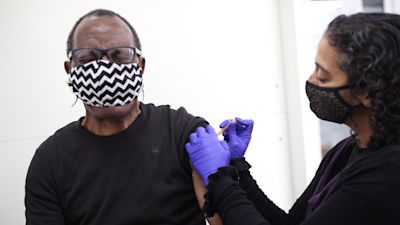Covid: Lack of trust over vaccine messaging could be behind jab hesitancy among people from ethnic minority backgrounds

ITV News Health Editor Emily Morgan explores why the rush of people getting vaccinated has slowed
Unclear communication and an apparent lack of trust in Covid vaccine message could be behind stubbornly high jab hesitancy figures among people from ethnic minority backgrounds in England, new figures show.
Language is a notable barrier, with the lowest vaccination rates observed for those who do not speak English at all (75.3%) and those who do not speak English well (75.9%), according to the data from the Office for National Statistics (ONS).
For those whose main language is English, vaccination rates rose to 92.7%.
"Long-term effects on health", "side effects" and "how well the vaccine works" were the top three reasons for reporting negative sentiment towards the jab, although the reasons for not having the vaccine "are likely to be complex", including being able to travel to a vaccination centre.
Young people also expressed a reluctance to take a Covid vaccine, with 13% of 16-29 year-olds, the highest of any age group, saying they would be wary of having the jab. Currently, adults over 40 or people with underlying health conditions are being offered a coronavirus vaccine.
What is vaccine take-up among ethnic minority groups?
Black Caribbean 66.8%
Black African 71.2%
Pakistani 78.4%
White British 93.7%
Differences in geography, socio-demographic factors and underlying health conditions do not fully explain the lower vaccination rates among ethnic minority groups, the ONS found.
Previously, doctors have warned a lack of trust in some communities due to racism, low confidence in the safety or efficacy of the vaccine, and limited endorsements from trusted community leaders contribute to vaccine hesitancy in people from ethnic minority backgrounds.
Although the UK's vaccination programme continues apace, with over half the adult population having received at least one dose , many ethnic minorities remain unlikely to take up the vaccine, causing concerns that groups who have been disproportionately impacted by the pandemic will remain at risk of coronavirus.
For people aged 50 and over identifying as black African the estimated rate is 71.2%, with rates of 78.4% and 86.9% for people from Pakistani and Bangladeshi backgrounds respectively.
The estimated rate for people identifying as white British is 93.7%.
Around one in three people in England aged 50 and over identifying as black Caribbean are unlikely to have received at least one dose of Covid-19 vaccine, the figures show.
Vaccination rates for this ethnic group up to April 12 are estimated to be 66.8%, the lowest among all ethnic minority groups.
Covid: Two Pfizer doses ‘95% effective against coronavirus infection, illness, and death’
Covid vaccine tracker: How many people have been vaccinated in the UK?
The vaccination rate among people aged 50 and over living in the most deprived areas of England was 87.8%, compared with 94.5% in the least deprived.
The analysis found there was little overall change in vaccine hesitancy despite concerns over very rare blood clots in people who had received the AstraZeneca jab.
Covid vaccine hesitancy: key findings:
More than 9 in 10 (93%) adults reported positive sentiment towards the vaccine, while 7% of adults reported vaccine hesitancy.
There was no significant change in vaccine hesitancy rates since our last analysis: 7% compared with 6% for 17 February to 14 March 2021.
13% of adults aged 16 to 29 years reported vaccine hesitancy, the highest of all age groups
Around 1 in 3 (30%) Black or Black British adults reported vaccine hesitancy, the highest compared to all ethnic groups
12% of adults in the most deprived areas of England (based on Index of Multiple Deprivation) reported higher vaccine hesitancy, compared with 4% of adults in the least deprived areas of England
Vaccination rates also differed by religious affiliation, the ONS found.
The lowest rates were among those who identified as Muslim (78.8%) or Buddhist (83.3%), while the figures for people identifying as Christian or Hindu were 93.2% and 92.0% respectively.
For those identifying as Sikh the rate was 91.9%, and for Jewish it was 91.8%.
Disabled people who reported being limited a lot in their day-to-day activities had a vaccination rate of 89.3%, compared with 92.3% for non-disabled people.
Commenting on the findings from today’s studies, Hugh Stickland from the Office for National Statistics (ONS) said: “Vaccination rates in the over 50s in England are lower in all ethnic minority groups compared with their White British counterparts, with the lowest rates in those who identify as Black Caribbean and Black African. Lower vaccination rates were also observed in those who identify as Muslim, disabled people, and those living in more deprived areas.
“This is broadly similar to the groups who express vaccine hesitancy. However, the reasons for lower uptake are likely to be complex, including for example being unable to travel to a vaccination centre.”
Listen to our coronavirus podcast:
Caroline Lucas, vice-chairwoman of the All-Party Parliamentary Group on coronavirus, said community engagement has shown it is possible to “overcome deep-seated mistrust” but it must be done at the grassroots level rather than “imposed by Whitehall”.
She added: “The pandemic has already exposed deep inequalities in our society.
“Dividing people into the vaccinated and unvaccinated through schemes like vaccine passports risks making this worse and alienating the communities where vaccine take-up is already low, particularly if they are used to restrict access to everyday services. That must not be allowed to happen.”